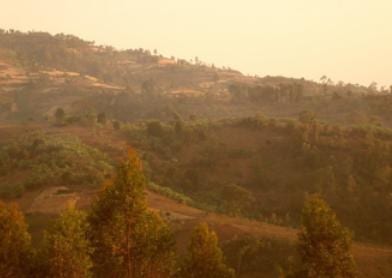
The green hills of Burundi.
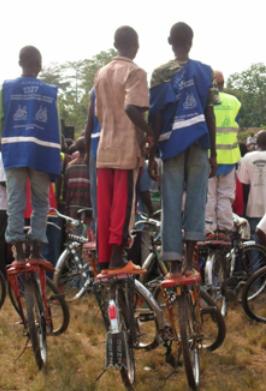
Spectators at a Bujumbura event.
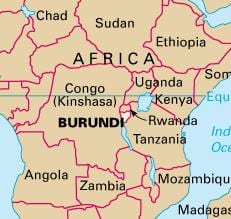
Burundi is a tiny country lodged between Rwanda, Tanzania and the Democratic Republic of the Congo.
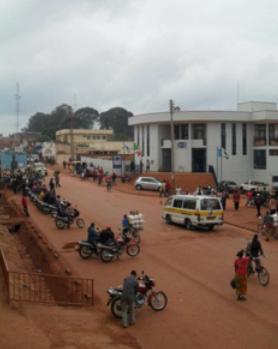
The main strip in Ngozi, Burundi.
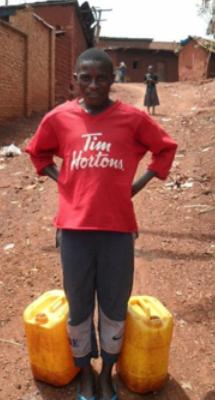
Many Canadian used clothes end up in the markets of the developing world.
In the tiny office of Humure, Burundi’s largest gay rights organization, there is only a single rainbow, on a crumpled poster that says: “Sex without a condom is the fastest route to AIDS transmission.”
“Oh, we got that from Kenya,” says Claude Kirezi, the coordinator of Humure, which means “don’t be afraid” in Kirundi, the local language.
Despite its name, the small gay community here prefers not to broadcast its existence. At the suggestion that the three Humure executive members who agreed to be interviewed use their real names in this story, they back their chairs away from the table where they sit.
“When I think of the risks I could run in my neighbourhood, in my family, at the mosque . . . absolutely not,” says Hassan Mugishu, a baby-faced young man who serves as the group’s president. “There are also a lot of Burundians in Canada, and we wouldn’t like them to find out anything.”
“Maybe in a few years we’ll be able to use our real names,” says Kirezi apologetically.
Burundi, a small landlocked francophone nation in East Africa, criminalized homosexual sex in 2009, joining a long list of more than 30 African countries that criminalize homosexuality or gay sex.
A 2009 Human Rights Watch report, Together, Apart, found of sub-Saharan Africa that “Virtually any move LGBT groups make, from renting an apartment to holding a press conference, can feed a violent moral panic, where media, religious figures and government collude.”
As Commonwealth leaders gather in Perth, Australia, from Oct 28 to 30, many African gays will be anxiously watching the leaders of Canada, Australia and other Western nations to see if they stay true to their word and take up the issue with the 41 Commonwealth members that still criminalize homosexuality.
Although Burundi is not part of the Commonwealth, neighbouring Rwanda recently joined, despite its historic ties to France.
In 2009, at the Commonwealth leaders meeting in Trinidad and Tobago, Prime Minister Stephen Harper and other leaders pressured the president of Uganda, Yoweri Museveni, to drop a bill that would have brought in the death penalty for homosexuals. The harsher elements of the bill were shelved, although gay sex remains illegal in Uganda.
In Burundi, homosexuality is punishable by a prison term of anywhere from two months to three years, for both men and women.
“Theoretically, yes, we could go to jail for what we do,” says Kirezi. “Although the law is very hard to enforce; it only criminalizes a sexual act, and I don’t see how people are going to go into other people’s bedrooms and find homosexuals
. . . but the law scares a lot of people.”
Kirezi is a founding member of Humure, which was established in 2003. In those days the group was called ARDHO, Association pour le Respect des Droits des Homosexuels (Association for the Respect of Gay Rights).
Membership grew slowly but steadily, from the original three members to 25 people in 2007. They participated publicly in AIDS prevention campaigns, along with Burundi’s National Association of People Living with HIV, and attracted the attention of friendly Western governments.
In 2007, the Dutch embassy financed the building of a cybercafé to help Bujumbura’s LGBT community connect with others around the world.
Then came criminalization.
“A lot of people were surprised,” Kirezi recalls. “There had been no [anti-gay] street protests . . . even the MP who proposed the law, he came a lot to our cybercafé.”
The law passed through the National Assembly, the lower chamber of the country’s parliament, but failed to pass the Senate.
“Many of the senators were saying, ‘If we can’t pay our civil servants, are gays really our problem,’” says Kirezi. “But President [Pierre] Nkurunziza and his party supported the law and he signed it into law six months later.”
The cybercafé soon closed after local queers became too scared to gather in a place known as a gay hangout.
“We had to step back a little,” says Kirezi, noting that the group turned its focus to health issues.
The word “homosexuals” in the group’s statutes was changed to “discriminated groups,” and the name was changed from ARDHO to Humure.
“We’re telling people that we are just like others and there is no need to be afraid of us,” Kirezi says.
The name change increased the group’s membership numbers, attracting those who were hesitant to be directly associated with gay rights.
Compared to other countries in the region, Burundi’s anti-gay law is relatively light. In Kenya, gay men face prison terms of up to 14 years if they are “caught.”
In neighbouring Tanzania, the penalty is life imprisonment. Uganda is still considering the death penalty for “repeat offenders.” All three countries are members of the Commonwealth. Many of these anti-gay laws are relics of their colonial past.
“Our situation is not as bad as our brothers’ in Uganda,” says Kirezi. “In Uganda there have been assassinations, threats and denunciations in the papers, and a friend of ours was beaten to death. Here the media are just not interested. There is no one here who has been beaten in the streets.
“There was a case in a nightclub where someone was stopped because he wore jewels and did his hair a certain way, and we intervened, but when the Human Rights Defense League intervened they let him go.”
However, the group fears criminalization and increasing stigma and homophobia in the region are making the situation worse.
Even though the law is not actively enforced, homosexuality remains a taboo subject.
Of the group, only Kirezi is out to his family. “I come from a family that’s fairly evolved, but that is definitely not the case for everyone,” he says.
Mugishu’s eyes widen at the suggestion. “If I came out?” he says. “It would be a catastrophe. My family knows only that I work in public health.”
“I think my parents know, but we haven’t talked about it,” says Raoul Cyemezo, the group’s legal representative. “It’s better that way, but Hassan here risks getting kicked out of his house. There are a lot of people who have been kicked out of their houses. We help them look for temporary housing.”
“There is a very traditional cultural and religious mentality here,” says Kirezi. “People say it is like having a curse. Traditionally we didn’t discriminate, but the situation has been made worse by religion.
“The problem now is that when people’s neighbours and family fear they are gay, they take them to the doctor to examine their anus to see if there have been homosexual relations. That’s ridiculous, of course; it shows to what level people are badly informed about this issue.”
Kirezi speaks of the need for gays to maintain a “normal image” in order to get jobs and be accepted in society. For him, organizing a gay pride event in Burundi is out of the question. “There, people would risk to be beaten to death,” he says.
Cyemezo thinks differently.
“A pride . . . why not?” he says. “We want the law to be repealed, we want to be treated like normal people, and why not have a homosexual politician? Just two years ago I didn’t think an AIDS prevention organization would buy lube, and they’ve done that.”
There are some positive signs.
The diplomatic community is sympathetic, and Kirezi points out that one opposition party, which believes gays are “people like others,” won four seats in Bujumbura in the last election.
“Hopefully in a few years we will have some rights,” says Cyemezo. “It will come.”
Real names have not been used. The photographer took these photos in Burundi and asked not to be identified. The people in these photos do not relate to this story; however, they all gave the photographer permission to take their photos.
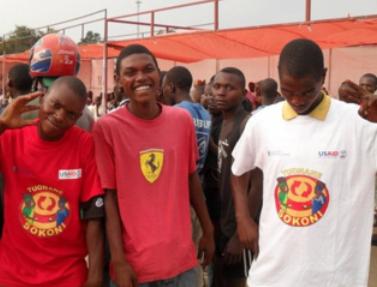

 Why you can trust Xtra
Why you can trust Xtra


